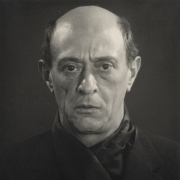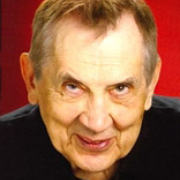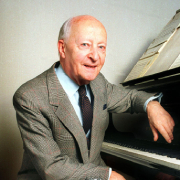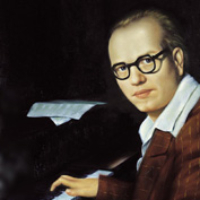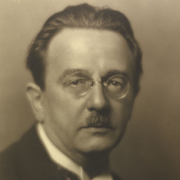From the Naxos Blog: Earworms for bookworms.
October 15, 2021I recently registered with my local library and duly received a plastic card that gives me borrowing rights. Covering the front of the card is a quotation:
“The only thing that you absolutely have to know is the location of a library.” – Albert Einstein
I wondered how many ‘books/livres/Bücher’ I could locate in my own music library that might appreciate a bit of a dust-down. Not just ‘books’ as a collective noun, so to speak, but ‘books’ with an extra-musical narrative to them. I’d like to share with you the first half dozen that turned up.
The American composer Ned Rorem is now aged 97. His first compositions date from 1945, since when he has produced more than 300 works in almost every genre. Scored for flute and harp, his Book of Hours was written in 1975. The eight short movements are named after the canonical times of day for Christian prayer. Listen to how deftly and simply he achieves the moods of the second and last movements, Lauds (Sunrise) and Compline (Nightfall).
Arnold Schoenberg (1874–1951) became interested in Stefan George’s poetry in the autumn of 1907; he set 15 of his poems for mezzo-soprano and piano the following year, the work bearing the same title as George’s collection: Das Buch der hängenden Gärten (The Book of the Hanging Gardens). At the first performance in Berlin in 1910, Schoenberg supplied a rather extraordinary programme note, indicating that his ‘book’ had a new spine:
“I have for the first time succeeded in approaching an ideal of expression and form which has been in my mind for years. Until now, I lacked the strength and confidence to make it a reality. But now that I have set out along this path once and for all, I am conscious of having broken through every restriction of a bygone aesthetic; and though the goal towards which I am striving appears to me a certain one, I am, nonetheless, already feeling the resistance I shall have to overcome: I feel that even the least of temperaments will rise in revolt, and suspect that even those who have so far believed in me will not want to acknowledge the necessary nature of this development.”
Here’s the text of the eleventh song from the set, Als wir hinter dem bebluhmten Tore (When we behind the flower-decked gate) in an English translation of the original German:
When we behind the flower-decked gate
at last only sensed each other’s breathing,
was our happiness what we thought?
I remember that, like weak reeds,
both mute we began to tremble
when we touched only lightly,
and that our eyes ran with tears.
So you stayed long by my side.
The Finnish composer Einojuhani Rautavaara died in 2016, aged 87. He composed his four-movement Book of Visions for orchestra between 2003 and 2005. Here’s his introduction to the work:
“A work of art is unpredictable; it makes its own rules. Thus it happened that it was in the process of composing the four movements of Book of Visions that the character and title of each movement began to emerge slowly. It was not a question of describing night, fire, love or fate, but of describing the effect of these phenomena on me – or rather, on the music being born. Visions were indeed seen, and Tales were told, though not by me using the music but by the music telling me. Each listener will probably generate his or her own visions and tales as I did, but as we know, the author’s interpretation cannot be considered any more valuable than anyone else’s.
Nevertheless, I cannot refrain from relating how important the Night was for me as a child: it was a time of omens, of horror and splendour, of hidden treasures. And indeed the opening of A Tale of Night is an omen. What about Fire, then? I shall never forget the flames of war over Helsinki. And Love – my own unbelievable love story has been the most important factor in my life. Finally, Fate. I am not superstitious by nature, but it could scarcely escape me that immediately after writing A Tale of Fate I had a near-fatal attack, with no warning, that hospitalised me for six months.”
Here’s Rautavaara’s A Tale of Fire.
A novelette is dictionary-defined as “a short piece of lyrical music, especially one for the piano”. The term was used by the composer Robert Schumann as a title for some of his piano works, a choice that reflected his literary background and interests. It was also used by Witold Lutosławski as the title for an orchestral work he wrote between 1978 and 1979; it was dedicated to Mstislav Rostropovich and the Washington National Symphony Orchestra, who gave the first performance in January 1980 in a programme that included Lutosławski’s Cello Concerto, also dedicated to Rostropovich.
Novelette has an opening Announcement and a final Conclusion, separated by three Events: the first is in measured time, but the second and third allow some fragments to be played ad libitum with others that are conducted. Typically, Lutosławski is sparing in his use of the full orchestra, preferring to make use of individual solo voices or smaller groups of instruments. Here are the Announcement and the three Events.
There are seven ‘Books’ (Livres) in French composer Olivier Messiaen’s ‘Catalogue of Birds’ (Catalogue d’oiseaux). Written for piano solo, its thirteen movements each portray a song-bird. Books 2, 4 and 6 present a single bird, taking some 15, 30 and 20 minutes respectively to perform. Performing the entire cycle takes more than two hours.
The intention of portraying each bird in its natural environment is made clear in the subtitle: ‘Bird-songs of the French provinces. Each soloist is presented in its habitat, surrounded by its landscape and by the songs of other birds (77 in all) from the region.’
Messiaen was very proud of the exactness of his musical descriptions: “All here is truth, even the countryside with all its sights, sounds, smells and thermal currents. Each piece has a brief preface for the performer or listener; as a further guide, vivid descriptions abound throughout the score. I’ve chosen the eighth bird in the cycle to play here – L’Alouette Calandrelle (Short-toed Lark), from Book 5. And here’s the preface that Messiaen supplied for the movement to be printed in the first edition of the score, published in 1958:
Provence in July: the Short-toed Lark. Two o’clock in the afternoon. Les Baux, Les Alpilles, broom and cypress trees. The monotonous percussion of the grasshoppers, the Kestrel raises a staccato alarm. The road to Entressan: the Crested Lark sings in two-part counterpoint with the Short-toed Lark. Four o’clock in the afternoon, La Crau. A stony wilderness, intense light, scorching heat. All that fills the silence is a brief little phrase from the Short-toed Lark. Towards six o’clock in the evening, a Skylark raises into the firmament and launches a jubilant strophe. The long-short-long rhythm of the Quail and a reminiscence of the Short-toed Lark.
For today’s final tome I’ve chosen the oratorio Das Buch mit sieben Siegeln (The Book with Seven Seals) by the Austro-Hungarian composer Franz Schmidt (1874–1939). The work is based on a section from a bigger book, The Bible, specifically from The Revelation of St John, alternatively known as The Apocalypse of St John. The first performance took place a year before Schmidt died and he produced extensive notes for the occasion. The Seven Seals are those that St John saw in a vision, the opening of each one producing an apocalyptic event. Here is an extract from Schmidt’s notes:
“Certain parts of the Apocalypse which are especially suitable for setting to music have often been used by composers, but as far as I know mine is the first attempt at a comprehensive setting.
The first part of the work … deals with the breaking of the first six seals by the Lamb; this is preceded by the story of mankind.”
Later:
“At the breaking of the fifth seal the souls of the martyrs appear with other victims of men’s crimes. They call for justice and punishment. The Lord bids them have patience and promises that they shall have justice at the Last Judgement. Since the greater part of mankind is still living in sin and obduracy, the Lord calls forth earthquakes and floods and fire over the face of the earth; so with the breaking of the sixth seal He destroys sinful man.”
































